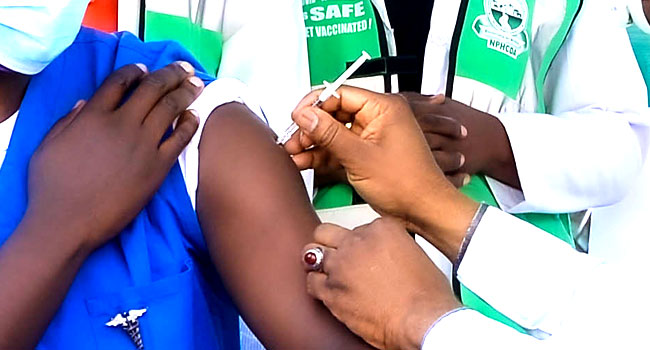Over 8,000 Nigerians Reported Mild Side Effects From AstraZeneca Vaccine, Says FG

![]()
The Federal Government on Friday said 8,439 persons across the country have reported mild side effects after they received the AstraZeneca COVID-19 vaccine.
The government through its healthcare agency, National Primary Health Care Development Agency (NPHCDA), disclosed this in Abuja.
Speaking during a press conference, NPHCDA Executive Director, Faisal Shuaib, said those who reported severe side effects were less than 100, adding that there has been no record of death or blood clots associated with the distribution of the vaccine.
“Out of over a million persons given the Oxford/AstraZeneca COVID-19 vaccine in Nigeria, 8,439 persons have suffered mild adverse events following immunisation (AEFI), and 52 persons moderate to severe adverse events on receiving the jab,” Shuaib said.
“While the mild reactions include body pains and swelling, the moderate to severe adverse events presented were fever, vomiting, diarrhoea, headaches, dizziness and allergic reactions.”
The NPHCDA boss listed the five states with the highest records of side effects as: Kaduna (970), Cross River (859), Yobe (541), Kebbi (511), and Lagos (448), noting that investigation is ongoing to verify the nature of the symptoms.
The executive director, who noted that the government has reviewed the timeframe for eligibility for the second dose in line with recommendations by WHO, added that the plan is to ensure that the first phase of vaccination is completed before the expiration date in July.
Speaking further, Shuaib explained that the government has reviewed the timeframe for eligibility for the second dose in line with recommendations by WHO.
According to him, the plan is to ensure that the first phase of vaccination is completed before the expiration date in July.
He added, “Furthermore, as a result of this overall programme review to meet the challenges of global vaccine demand and supply mismatch, and the late commencement of the vaccination in some states, we are expanding the eligibility period between the first and second doses of the vaccine from 12 weeks to between eight to 12 weeks.
“This is still in line with the scientific recommendation provided by the World Health Organisation’s Strategic Advisory Group of Experts (SAGE on immunisation) that the two doses of the vaccine be given at an interval of eight to 12 weeks.”
Nigeria has received close to 4.5 million doses of the vaccine in which 3.94 million have been delivered via the United Nations-led COVAX facility, while others are donations from India and private organisations.
Since the rollout began on March 5, more than one million Nigerians have received the first dose of the vaccine.


